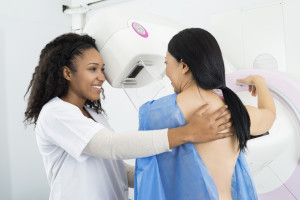 A mammogram is an X-ray of the breasts. Mammograms do not prevent cancer but instead screen for breast cancer before it is big enough to feel or cause any symptoms. Mammograms can show changes in the breasts up to two years before a physician or patient can feel them. Early detection of breast cancer is vital and diagnosing it at an early stage can lower the risk of death by 25-30% or more.
A mammogram is an X-ray of the breasts. Mammograms do not prevent cancer but instead screen for breast cancer before it is big enough to feel or cause any symptoms. Mammograms can show changes in the breasts up to two years before a physician or patient can feel them. Early detection of breast cancer is vital and diagnosing it at an early stage can lower the risk of death by 25-30% or more.
The Houston’s Women’s Imaging department at OakBend Medical Center offers high-quality breast cancer screenings and a comprehensive range of diagnostic and interventional services to accurately diagnose and treat breast cancer and other breast conditions. For more information please call 713-341-3000.
When should you get a mammogram
The American Cancer Society has set guidelines for mammograms and the early detection of cancer.
• Women 40-44 can choose to start annual mammograms if they wish. Women with a history of breast cancer in their family should talk to their health care providers about screening even earlier and discuss the best screening plan for them.
• Women 45-54 should get yearly mammograms.
• Women 55 and older should get mammograms every 2 years, or can continue annually if they choose to do so.
According to the American Cancer Society, all women should know the benefits, limitations and potential harms associated with mammograms.
Benefits of mammograms
Early detection and treatment of breast cancer can save women’s lives. Breast cancer is usually treatable during the first stages. As the cancer progresses or spreads the chances of successful treatment/removal decline. Additionally, when caught early, some localized breast cancers can be taken out without the need of a mastectomy (breast removal).
Limitations/Risks of mammograms
Mammograms aren’t perfect and sometimes normal breast tissue can hide breast cancer resulting in a false-negative result. Even more often, non-cancerous abnormalities are found in the breasts which result in a false-positive result. This can lead to further and unnecessary testing and follow-up visits which can be stressful.
Mammograms do expose women to a small amount of radiation but modern-day mammogram testing has less exposure than a standard chest X-ray and the risk involved is minimal.
To combat these limitations women should do monthly self-examinations and be familiar with the look and feel of their breasts. Women should also have regular breast examinations from experienced health care professionals.
How to prepare for a mammogram
• Do not wear deodorant or power under the arms on the date of the procedure.
• If possible, bring old exams or make them available to OakBend Medical Center when you arrive for your mammogram.
• Describe any symptoms you may be experiencing to the technologist performing the exam: describe any lumps, discharge, rashes, pain or skin changes.
• Avoid caffeine (including coffee, tea, chocolates and soft drinks) for a at least 3 days before the appointment. Caffeine can sometimes increase breast sensitivity.
• Don’t be afraid. Mammograms are routine and safe procedures which only take about 20 minutes. Discomfort is minor for most women.
Unfortunately, even when breast cancer is found early by a mammogram the patient may still not survive. However, the best chance of success is when the cancer is detected before is spreads. The staff at OakBend Medical Center are committed to guiding patients through every step of the diagnostic process. They understand the stress and anxiety caused by waiting for results after a questionable finding. Therefore, they try to schedule follow-up testing and even biopsies the same day, when possible, so the patients can get their results as soon as possible.
Unfortunately, even when breast cancer is found early by a mammogram the patient may still not survive. However, the best chance of success is when the cancer is detected before is spreads. The staff at OakBend Medical Center are committed to guiding patients through every step of the diagnostic process. They understand the stress and anxiety caused by waiting for results after a questionable finding. Therefore, they try to schedule follow-up testing and even biopsies the same day, when possible, so the patients can get their results as soon as possible.
Scheduling a Houston mammogram
If you are over 40 or have a history of breast cancer in your family please contact a Houston imaging specialist at OakBend Medical Center to schedule a mammogram. If you have any questions about mammograms or breast cancer screenings please call 281-341-3000. The woman’s imaging center at OakBend Medical Center is equipped with the latest technologies and procedures for breast screening and diagnosis.
When Should I Get a Mammogram?
OakBend Medical Center © 2024 All rights reserved
